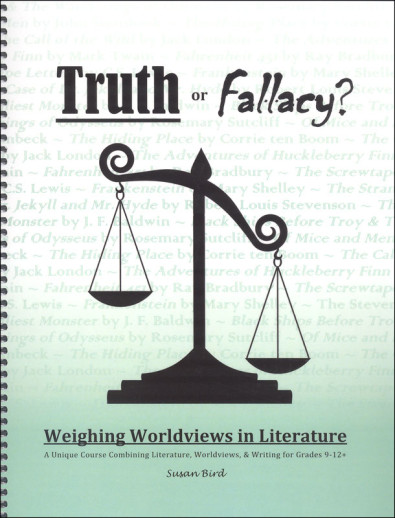We use cookies to make your experience better. To comply with the new e-Privacy directive, we need to ask for your consent to set the cookies. Learn more.
Truth or Fallacy?
All literature focuses on themes rooted in a Biblical foundation: good vs evil, power, conflict, loss, and more. But, is the novel you're reading mirroring Biblical truth or fallacy? Subtitled, Weighing Worldviews in Literature, this text provides teachers the tools to teach students how to identify and evaluate text material. For each novel, students evaluate literary value and worldview distinctives through essays, activities, and discussion. The text includes a suggested 1-year syllabus and 20 pages of teacher materials (including reproducible forms, literary helps, writing tips, and more). Course recommends meeting in a small group setting approximately 2 hours weekly for 32 weeks – perfect for siblings or co-op.
Students engage with each of 11 novels. These alternate between Biblical and secular world views (Frankenstein; The Strange Case of Dr. Jekyll and Mr. Hyde; The Deadliest Monster; Black Ships Before Troy; The Wonderings of Odysseus; Of Mice and Men; The Hiding Place; The Call of the Wild; The Adventures of Huckleberry Finn; Fahrenheit 451; and The Screwtape Letters). Depending on your edition choices, this equates to just over 1800 pages of reading—a fairly average amount of reading. Also required are 3 TrueU Worldview DVDs (Does God Exist; Is the Bible Reliable? or Who is Jesus?). Students watch these episodes weekly, discussing, and applying concepts to each book.
Follow a 3-week pattern for each novel. In Week A, students begin reading the assigned novel and watch assigned worldview episodes. Prior to Week B, students are to finish the reading and have filled out the included Book Evaluation Form, focusing on literary content, style, and worldview. Teachers guide discussion and analysis (suggested, but not scripted answers provided). Various provided activities (a little prep needed) reinforce learning: students might match characters to their words; read dramatically; complete a worldview crossword; and more. They'll analyze and discuss each text's literary elements, world view, ideas, writing style, and morality. During Week C, students identify and respond in essay format to Truth (defined by God's Word) vs Fallacy found in the literature and present their analysis. Key elements of a 5-paragraph essay are overviewed, but the text assumes students have a working understanding and experience with composing skills. Essays require students to identify and respond to the writing's truths and fallacies, presenting these thoughts to the class (or family). Early units provide thesis statement suggestions, but later units expect independent work. Each unit provides sample student essays from a variety of grades—worthwhile for teaching, discussion, and analysis. Students will create a binder of their work.
The publisher suggests assigning 1.5 credits of literature and composition (2 credits if spending 90 minutes daily 4x per week) with the possibility of a ½ credit in Bible/worldview. Spiral bound, 188 pgs, pb. ~ Ruth
Truth or Fallacy? Weighing Worldviews in Literature is a user-friendly, comprehensive guide for teaching and facilitating a full-year course that meets approximately two hours per week. It is designed for use with 9th to 12th grade Christian homeschooled students in a group setting. The course consists of three strands: Worldviews, Literature, and Writing, which rotate as the primary focus of each week.
For the worldviews strand of the course, users should purchase TrueU DVDs by Focus on the Family; these are an excellent aid to help your teen understand worldview, stand firm in their Christian faith, and be able to give a reason for the hope that is in them.
For the literature strand of the course, students read eleven books throughout the course of the school year. Fun, interactive discussion and activities guide teacher and students through the reading and appreciation of both classic and Christian literature and go on to demonstrate how to delve in deeper to identify an author's worldview. As students learn to compare the worldview presented by an author to the truth of God's Word, they learn to stand firmly on a foundation of truth and to view others with compassion. Because of this, great literature is a fabulous tool for students to learn to engage in this war of ideas, and take a firm stand for Christ! Books used in the ten units of this course are: Frankenstein, The Strange Case of Dr. Jekyll and Mr. Hyde, The Deadliest Monster, Black Ships Before Troy & The Wanderings of Odysseus, Of Mice and Men, The Hiding Place, The Call of the Wild, The Adventures of Huckleberry Finn, Fahrenheit 451, and The Screwtape Letters.
For the writing strand of this course, students write a five-paragraph essay comparing the worldview of each author to the truths of the Bible. As they learn to personally respond to the truths or fallacies presented, they also gain experience sharing the good news of Christ with depth, understanding, and impact. Prior to writing, students are fully primed for the task. Thought-provoking sample essays are provided for students to discuss and evaluate; writing helps and prompts are offered in each unit. Writing is remarkably motivating and meaningful in this group setting, where presenting essays and listening to the essays of others becomes the highlight of the class.
This course will help students learn to think critically, write excellently, stand in their faith firmly, and view others compassionately. This fun and interactive course is great preparation for college!
| Product Format: | Paperback |
|---|---|
| Brand: | Susan Bird |
| Author: | Susan Bird |
| Grades: | 9-12 |
| Length in Inches: | 11 |
| Width in Inches: | 9 |
| Height in Inches: | 0.75 |
| Weight in Pounds: | 1.3 |

